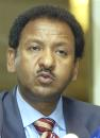Khartoum maintains hard line on rebel arms as peace talks reopen
 KHARTOUM, Sept 4 (AFP) — The Sudanese government kept up its demand for ethnic minority rebels in Darfur to be disarmed alongside state-sponored Arab militias, as troubled peace talks resumed in Nigeria Saturday.
KHARTOUM, Sept 4 (AFP) — The Sudanese government kept up its demand for ethnic minority rebels in Darfur to be disarmed alongside state-sponored Arab militias, as troubled peace talks resumed in Nigeria Saturday.
Foreign Minister Mustafa Osman Ismail railed against what he
described as the double standards of the international community in demanding the immediate disarmament of the militias but not putting the same pressure on the rebels, the Khartoum press reported.
“The two rebel movements were moving around with their weapons among civilians,” the Al-Akhbar Al-Youm daily quoted the minister as saying.
Ismail said that both the African Union’s resolution on the
Darfur crisis and the abortive ceasefire agreement reached in Chad in April required cantonment of the rebels concurrently with disarmament of the militias.
“But the rebels did not respond to this condition,” the minister
said, insisting the militias had only armed themselves to protect
their Arab fellow tribesmen.
“How can we disarm when the rebels are still holding onto their
weapons?” he asked.
A report to the Security Council by UN envoy Jan Pronk reported
that by the August 29 deadline set last month Khartoum had done
nothing to meet its obligation to disarm the militias held
responsible for a reign of terror in Darfur.
Ismail took issue with that assessment, insisting “the
government has begun disarming” the militias.
The issue of cantonment of rebel forces is a major stumbling
block at peace talks in Abuja, with the rebels refusing to
countenance any such move while the militias remain at large.
The talks resumed Saturday after a pause for the Muslim day of
rest.
In an interview with state television Saturday, Ismail also
renewed Khartoum’s opposition to the deployment of any additional
foreign troops to Darfur without its explicit consent.
He said Khartoum reserved the right to approve each
troop-contributing country and even the identity of individual
monitors.
He also reiterated his government’s opposition to any move to
convert the African Union protection force currently charged with
assuring ceasefire monitors’ security into a full-blown peacekeeping
force.
His comments came as Nigerian President Olusegun Obasanjo
pledged the African bloc would send more troops to Darfur if
requested to do so.
Ismail insisted that despite the UN envoy’s critical report, he
was “not disturbed” by the Security Council’s imminent response.
“It will demand from the government more security measures,” he
predicted, referring in particular to greater protection for the 1.2
million plus people estimated to have been displaced from their
homes by the government’s clampdown, who still complain of
harassment by militiamen around their camps.
